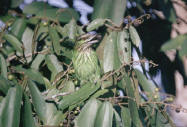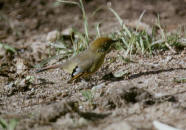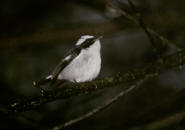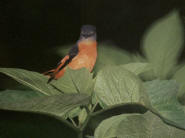Visit your favourite destinations |
| A Report from birdtours.co.uk |
Doi Angkhang and Doi Inthanon 3-5/11/02,
 |
Incredible! Incredible! How else can I describe standing, surrounded by a milliard of birds, buzzing and dashing around me in an area the size of an average classroom. Where was I? Early morning at km 37.5, Doi Inthanon. An incredible amount of moths and insects are attracted to the light by the checkpoint here and a host of birds come to feed on them in the wee hours of the day. |
Large Niltava, Small Niltava, Pied Flycatcher, Rufous-winged and Grey-cheeked Fulvettas, Grey-chinned and Short-tailed Minivets, Yellow-cheeked Tit, Dark-backed and Rufous-backed Sibias, Spectacled Barwing etc were feverishly feeding on the abundance of insects. Boy, did I ever have a rush? An amazing encounter of one of God's wonders.
We then proceeded to the top, entering the all encompassing clouds, resting over the upper part of the mountain. To our amazement we soon penetrated the white 'cotton' and found ourselves on the other side with a fabulous bright, blue sky, warming up the cold morning air. We stopped to take in the breathtaking scenario, watching the cloud carpet cover the mountains below us, leaving only a few distant peaks visible. Truly wonderful view!
The Summit was normal this early November day. Chestnut-tailed Minlas (right) were all over and very easy to photograph. The common Chestnut-crowned Laughingthrush took a little while to detect but we caught up with a few. Green-tailed Sunbirds were actively feeding on nectar on flowering bushes. |
 |
In the bog, the Eye-browed Shortwing sang and let us have complete views. The first bird to greet us in the bog though was the ever so charming little Pygmy Wren Babbler. It came within arms lengths and I couldn't even focus my camera on the little fellow.
A pair of Snowy-browed Flycatchers revealed themselves in the low bushes. They perched at lengths and I started snapping away. Much to my grief the flash wouldn't work no matter what I did. I even had time to change film and batteries while the birds were perched still. You can understand my frustrations and at the same time marvel of watching these magnificent birds!
We also had Dark-sided Thrush and Ashy Wood Pigeons along with Ashy-throated Warblers in here.
Late morning we went to Geew Mae Ban nature trail. I wanted to show the Treecreeper I had seen earlier in the year in some montane oak forest. We had no sooner entered the area when a pair showed up. They were doing their normal 'up and down' the tree acrobatics. While Bengt and kids went on to the cliffs I started walking back to the entrance of the trail. There is not normally much bird life in here so every little sound counts. I heard what I thought to be a Slaty-bellied Tesia singing from down a gully by a stream. I went down and stood on the little moss covered, wooden bridge, eagerly scanning the vegetation. A few leaves were moving just a tiny bit more then being moved by the wind alone. Waiting and waiting I then caught sight of a Chestnut-headed Tesia! I was simply elevated! What a treat! My 4th lifer!
 |
Little Pied Flycatcher |  |
Grey-chinned Minivet, male |
We left the gates (a Blue Magpie was hopping on the road here in the early morning) of DI at 1 PM.
Why did I start with DI? Well, DI was a climax to a very unusual birding trip. I had set my mind on Doi Angkhang and Doi PaHomPok in the very North. My friend, Bengt Legnell, legnell@hotmail.com , who lives in Chiang Mai and works with the same volunteer work as I do in Bangkok, told me that 'the weather has been fantastic here lately, presumably leaving the rainy season behind us'.
I arrived to rain and dark clouds Saturday the 2nd. We loaded up our 4 wheel drive and headed to Doi Chiang Dao. Here we checked out the Temple grounds trying to not get too wet. This is a very birdy area but we couldn't stay on. We then headed up the mountain towards where pine forest sets in. Still gloomy and wet we started going down a small dirt road to a Lizu village. Somehow we managed to get stuck in the muddy road and decided to go no further. Timely, a village hunter, with an old, incredibly long rifle, came by . We explained ourselves (I speak Thai but this man hardly did) and let him know that if he could get help from the village we would deliver all the clothing right there and then.
A group of 8 young men came and after much pushing and lifting we managed to get the vehicle free.
They were very pleased to leave with many boxes of warm clothing. Had we not managed to free ourselves we may still be on that mountain as far as I can imagine.
Doi Angkhang was covered in mist and temperate rain from the time we arrived until 44 hours later when the clouds vanished, giving us 6 hours of good light. I actually didn't mind as the contrast from hot Bangkok was striking. We did a lot of road side birding from the car, braving the rains when necessary.
Due to the weather, birds moved about slowly and we generally obtained good views of what we saw.
Some of the highlights from DAK.
A flock of atleast 50 Red-whiskered Bulbuls mixed
with a few Brown-breasted moving through the mist covered pine trees.
I have never seen such a big flock before.
A huge mixed flock of Japanese and Chestnut-vented White-Eyes feeding
in a flowering tree.
A single Scaly Thrush feeding on the ground on an open grass patch.
A pair of Mountain Bamboo Partridges slowly walking along the trail at
km 21.5
A flock of a dussin Silver-eared Mesias in low bushes.
Many Great Tits, reminding me of my Nordic homeland.
Plenty of Olive-backed Pipits and Grey Bushchats as constant companions.
An Aberrant Bush Warbler on the trail at 21.5.
Spot-throated Babblers on two occasions.
A flock of 6 Striated Bulbuls giving clear views.
Lots of Blue-winged Minlas and Verditer Flycatchers.
No Crested Finchbills and only a short glimpse of Red-faced Liochicla.
We stayed at KhangVilla which is a good alternative to the much more upscale Amarin Nature resort. Look for their sign above the roof tops in the village.
We decided to take the longer mountain road back to CM. This road has some spectacular scenery with lots of healthy looking forest along the road. It winds its way through a few hill tribe villages and the feeling of being remote is imminent.
As we started on our way home I felt very satisfied even though we had had poor weather for birding and the numbers of birds seen had been on the low side. Just being able to wear a few layers of clothing and feeling the elements along with the fresh scents of pine and forest was enough for me. I had had only one lifer: Spot-throated Babbler, but didn't really mind. We then caught eyes of some Eye-browed Laughing Thrushes, moving in the tall grass along the road. I quickly jumped out of the car and decided to scramble through the grass for more looks. Once through some 10 meters of thick grass, a steep mountain side opened up. Here in a wind beaten short tree sat my 2nd lifer, a Rusty-cheeked Scimitar Babbler. Triumphantly, I moved back to the road sharing my joy with Bengt who had stayed behind.
He was busy trying to watch a group of something else. I thought since it had worked so well to crash through the grass once, I should try it again. So I did, and lo and behold, an incredible Grey-headed Parrotbill came in full view in another of these hardly little trees. My lifer number 3. I simply felt elevated and content even though we had to cancel our proposed trip to Doi PoHomPok.
Once back home again a cold front has now moved in over Northern Thailand. Hopefully I will be able to fit another trip to these mountain again in the not too distant future.
| Check list Doi Angkhang 3-4/11 and Doi Inthanon 3/11/02 |
DAK |
DI |
| Birds heard only not included. | ||
| 1. Pied Wagtail | several |
|
| 2. Grey Wagtail | common |
X |
| 3. Olive-backed Pipit | common |
|
| 4. Grey Bushchat | common |
|
| 5. Stonechat | X |
|
| 6. Brown Shrike | common |
|
| 7. Burmese Shrike | X |
|
| 8. Long-tailed Shrike | X |
|
| 9. Grey-backed Shrike | X |
|
| 10. Abberrant Bush Warbler | X |
|
| 11. Inornate Warbler | X |
|
| 12. Chinese Leaf Warbler | common |
|
| 13. Ashy-throated Warbler | X |
|
| 14. White-tailed Warbler | X |
|
| 15. Golden Spectacled Warbler | X |
|
| 16. Dusky Warbler | common |
|
| 17. Little Pied Flycatcher | ||
| 18. White-throated Fantail | X |
X |
| 19. Yellow-bellied Fantail | X |
|
| 20. Snowy-browed Flycatcher | X |
|
| 21. Grey-headed Flycatcher | X |
|
| 22. Verditer | common |
|
| 23. Large Niltava | X |
|
| 24. Small Niltava | X |
|
| 25. Rufous-bellied Niltava | X |
|
| 26. Black-crested Bulbul | common |
|
| 27. Red-whiskered Bulbul | common |
X |
| 28. Sooty-headed Bulbul | X |
|
| 29. Mountain Bulbul | X |
|
| 30. Striated Bulbul | X |
|
| 31. Brown-breasted Bulbul | common |
|
| 32. Ashy Bulbul | X |
|
| 33. Black Bulbul | X |
|
| 34. FlavescentBulbul | common |
X |
| 35. Slender-billed Oriole | X |
|
| 36. Ashy Drongo | X |
X |
| 37. Spangled Drongo | X |
|
| 38. Lesser Racket-tailed Drongo | X |
|
| 39. Bronzed Drongo | X |
X |
| 40. Green-billed Malkoha | X |
|
| 41. Chestnut-vented Nuthatch | X |
|
| 42. Magpie Robin | X |
|
| 43. Chestnut Bunting | X |
|
| 44. Blue-throated Barbet | X |
|
| 45. Golden Barbet | X |
|
| 46. Short-billed Minivet | X |
X |
| 47. Long-tailed Minivet | X |
X |
| 48. Grey-chinned Minivet | X |
X |
| 49. Silver-eared Mesia | X |
|
| 50. Spectacled Barwing | X |
X |
| 51. Black-headed Sibia | common |
X |
| 52. Rufous-backed Sibia | common |
X |
| 53. Scaly Thrush | X |
|
| 54. Blue Whistling Thrush | both races |
X |
| 55. Blue Rock Thrush | X |
|
| 56. Wedge-tailed Pigeon | X |
X |
| 57. Ashy Wood Pigeon | ||
| 58. Great Tit | X |
|
| 59. Yellow-cheeked Tit | ||
| 60. Blue-winged Minla | common |
|
| 61. Fire-breasted Flowerpecker | X |
|
| 62. Common Rosefinch | X |
|
| 63. Eye-browed Laughingthrush | X |
|
| 64. Chestnut-crowned Laughingthrush | X |
|
| 65. Pygmy Wren Babbler | X |
|
| 66. Rufous-fronted Babbler | X |
|
| 67. Spot-throated Babbler | X |
|
| 68. Rusty-cheeked Scimitar Babbler | ||
| 69. Gould's Sunbird | X |
|
| 70. Green-tailed Sunbird | X |
|
| 71. Streaked Spiderhunter | X |
|
| 72. Japanese White Eye | X |
|
| 73. Chestnut-vented White Eye | X |
|
| 74. Himalayan Swiftlet | X |
|
| 75. Pacific Swift | X |
|
| 76. Barn Swallow | X |
|
| 77. Red-rumped Swallow | X |
|
| 78. Asian House Martin | X |
|
| 79. Common Buzzard | X |
|
| 80. Oriental Hobby | X |
|
| 81. Mountain Hawk Eagle | X |
|
| 82. Common Kestrel | X |
|
| 83. Mountain Bamboo Partridge | X |
|
| 84. Red-faced Liochicla | X |
|
| 85. Chestnut-tailed Minla | X |
|
| 86. Grey-chinned Fulvetta | common |
X |
| 87. Rufous-winged Fulvetta | X |
|
| 88. Blue Magpie | X |
|
| 89. White-browed Shortwing | X |
|
| 90. Chestnut-headed Tesia | X |
|
| 91. Grey-headed Parrotbill | X |
|
| 92. Hill Prinia | X |
|
| 68 species |
34 |
|
Why not send us a report, or an update to one of your current reports?